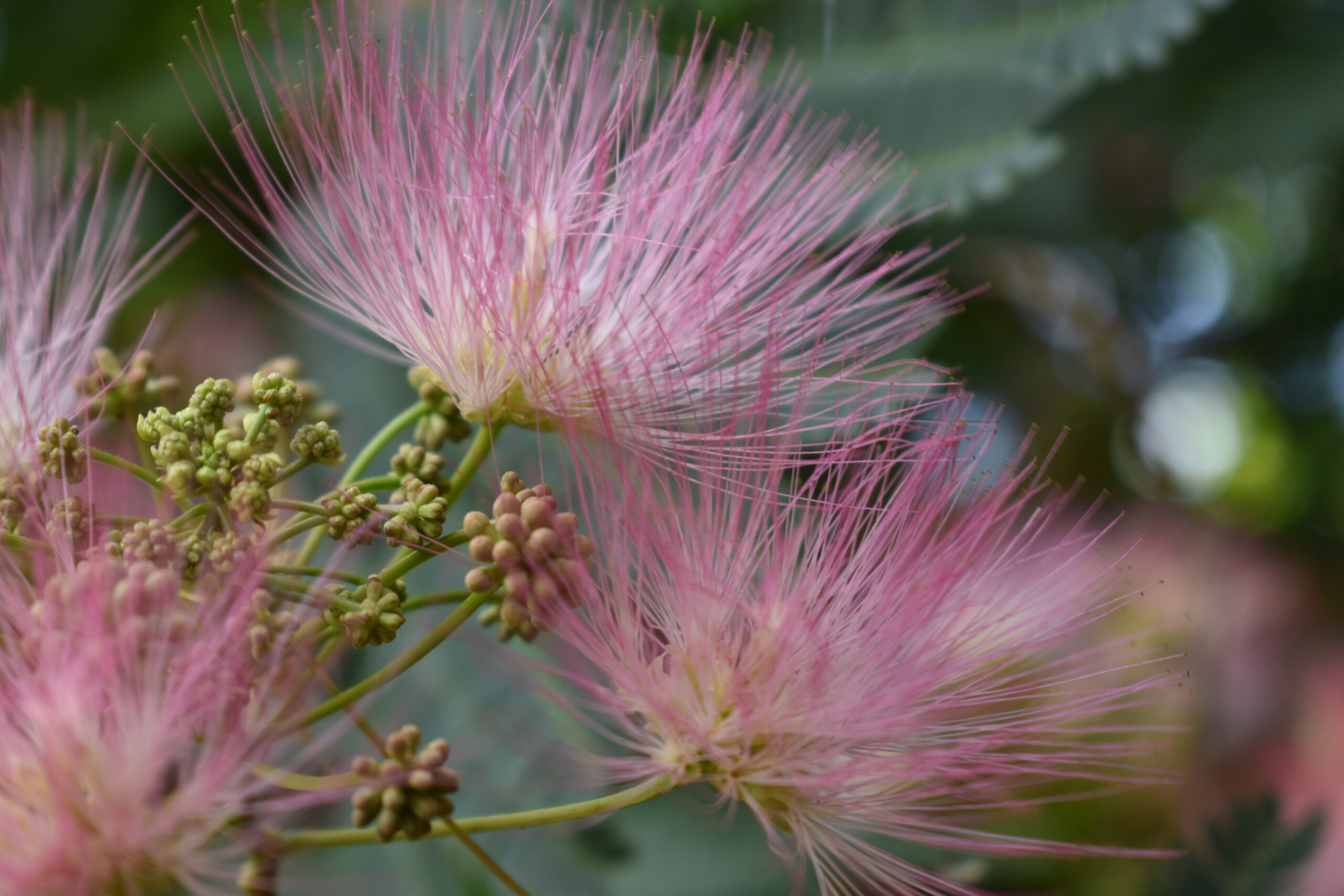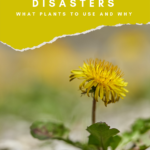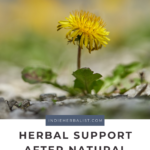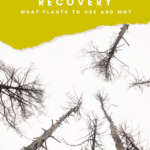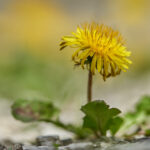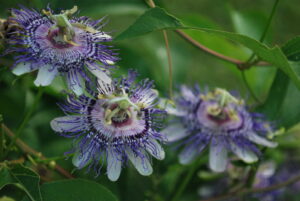Links contained in this post and elsewhere on my website may include affiliate links. When you make a purchase through these links, I earn a commission at no additional cost to you. I only link to products and services that I love - and that I think you will love, too!
With hurricanes and wildfires becoming increasingly unpredictable, planning for natural disasters makes sense. Having evacuation plans in place and emergency kits at the ready is becoming increasingly important for many. As an herbalist, botanicals are an important part of my kits. Here’s a look at some of the most accessible, versatile herbs for natural disaster preparedness (and some of my crazier weather-related experiences).
Basic natural disaster preparedness with herbs
For any type of natural disaster, herbs that support the mind and nervous system are essential. Natural disasters are life-altering for those affected. The trauma from a natural disaster, or even an evacuation, can lead to higher levels of stress and anxiety, and changes in sleep, appetite, and mood. Grief from the sudden loss of loved ones or even a way of life can be another challenge.
All of these things can also work to lower the immune functions that fight infections, creating the perfect scenario for getting sick and being even more miserable. Long-term stress also sets the stage for many chronic health conditions. So stress management and support is one of the most important (and often overlooked) parts of emergency planning.
Adaptogens that support the body’s ability to cope with stressful scenarios are one way to support the nervous system during this type of upheaval. Adaptogens include:
- Rhodiola rosea (Rhodiola)
- Eluetherococcus senticosus (Eleuthero)
- Withania somnifera (Ashwagandha)
- Panax quinquefolius (Ginseng)
- Schisandra chinensis (Schisandra)
- Ocimum tenuiflorum (Tulsi)
To successfully use adaptogens during a stressful event, it’s best to have a blend tucked into your kit that you know works well for you. If you don’t already use adaptogens, consider trying out a few off-the-shelf products until you find one you like. Stock up and keep a extra bottle or two in your herbal preps.
Additionally, calming nervines are beneficial for acute frayed nerves and grief.
Common nervines that you might know include:
- Scutellaria laterifolia (Skullcap)
- Leonurus cardiac (Motherwort)
- Passiflora incarnata (Passionflower)
- Albizia julibrissin (Mimosa)
Like adaptogens, nervines work well as part of a blend. Because every person will respond slightly differently, it’s a good idea to try a couple and find one that works well for you. Look for a blend that can be used during the day. Herbs like Humulus lupulus might make some people drowsy.
My article about creating a personalized herbal comfort kit is a good resource for taking the first steps for preparing with herbs. Once your comfort kit is ready, think about the types of natural disasters you might face.
In some parts of the country, wildfires are common. Harsh winters might be common in your area. Or, a hurricane or flood event might be more likely. Here are some common scenarios and herbs to consider for each.
Best herbs for wildfires
Wildfires create air quality issues. Even if you don’t need to evacuate, smoke in the air is really uncomfortable! One year there was a big fire in the Cohutta Wilderness about six miles from my house. Thankfully, we didn’t need to evacuate. However, the smoke was really bad.
I was very glad I had these herbs on hand:
- Plantago lanceolata (Plantain. Plantago major is also wonderful)
- Althea officinalis (Marshmallow)
- Glycyrrhiza glabra (Licorice)
These plants are good for the throat and lungs. They can help provide moisture for dry cough and sore throat from smoke irritation. You can use them as extracts or as tea, but I prefer teas. Water helps extract the slippery soluble fiber better than alcohol.
An herbal eyewash was also really important for me. The brand I use is discontinued, but it’s not hard to make your own. You can watch this video by herbalist Sam Coffman to learn more about herbal eyewashes. Good ingredients to consider are the ones listed above, as well as Oregon grape root.
Even during regular, controlled burns, smoke can be annoying. It’s also enough to cause flare-ups of respiratory conditions like asthma and make eyes sting and feel dry and gritty.
If you have pets or livestock, you may notice that they are uneasy and restless when the air is heavy with wildfire smoke. Their instincts are telling them to be ready to flee. Keeping them comfortable with herbal support is also possible. Powdered herbs that promote calm are great for horses, cattle, and other livestock. It’s easy to incorporate into their feed. For my dogs and cats, I prefer extracts and glycerites.
Winter storm natural disaster preparedness herbs
Here in the Southeast, ice storms are common every few years. When I was a child, we even had a blizzard! What makes our winter storms so terrible is the ice. Our temps don’t stay cold. Things thaw during the day and then freeze overnight.
With an ice storm, we can expect to be out of power for a few days in rural areas. It’s also unwise to travel. Unlike northern states, our DOT doesn’t keep many snow plows or a large supply of salt. Even if you live in a big city like Atlanta, you can’t expect the roads to be safe.
Herbs that are useful for winter storms are immune support herbs and general warming herbs to increase comfort. In traditional herbalism, herbs are classified as either cooling or warming.
Warming, immune herbs for winter include:
- Eleutherococcus senticosis (Eluethero)
- Astragalus membranaceus (Astragalus)
- Zingiber officinale (Ginger)
- Inula helenium (Elecampane)
- Thymus vulgaris (Thyme)
- Sambucus nigra (Elder)
Eleuthero is also on the adaptogens list. However, I really love this herb as a winter tonic. Astragalus is one of the main ingredients in Jade Screen formula, a traditional front-line defense for winter health woes. I like keeping thyme and elecampane for respiratory support. Elecampane is versatile and I use it for wet or dry coughs. It’s also used traditionally for strength and recovery after an illness.
Technically, elder is cooling and not warming. Almost everyone knows elderberry syrup, but I prefer keeping an extract of the flowers. Elderflowers are diaphoretic. They support the body during a fever. Hence, very useful during winter woes.
And if you don’t have a winter kit for your car, please get one! Ice storms can happen quickly and shut down roads before everyone has a chance to get home. For example, this happened in Atlanta in 2014.
The Survival Mom blog has a great article about How to Survive in a Stranded Car in Winter. You can find great tips and a list of items to keep in your car.
Herbs for storms and flooding
Nothing has been quite as anxiety-inducing for me as a mega-storm coming inland from the coast. I’ve only had to deal with this once, and it was not fun. My house was surrounded by trees. The area was prone to flooding. The forecast of extremely high winds left us scrambling to secure everything around the farm. We didn’t have materials to board the windows- that kind of weather was unprecedented in our area. This was NOT one I expected!
Tornadoes? Sure. Tornadoes are much more common in our area. The Tennessee Valley and the mountains in the northwest part of our state create a Southern Tornado Alley. Do I know exactly what to do if a tornado happens while I’m driving? Yes. Been there, done that. Do I automatically know the safest room for inclement weather in the house or the store or whatever building I’m in? Also yes.
Sustained tropical winds and a truly spectacular amount of rain? Not so much. Atlanta was hit much harder than we were, but it was still rough.
Either way, big storms potentially cause two things: traumatic injury and upset stomach from contact with contaminated water. Respiratory issues from mold and dampness can also become an issue. Make sure your wilderness first aid skills are up to snuff to be ready for the aftermath of a big storm. Then consider herbs that support the digestive tract and respiratory tract. Add traditional pain relief herbs and herbs that support the body while it recovers from traumatic injury.
Examples of herbs that I like for recovery from traumatic injury are
- Achillea millefolium (Yarrow)
- Albizia julibrissin (Mimosa)
- Valeriana officinalis (Valerian)
- Plantago lanceolata (Plantain)
Yarrow is my go-to herb for stopping bleeding from lacerations and helps support the body as it clears bruises. Mimosa is a great nervine, but the bark is also an important blood mover in TCM. It’s used in that capacity to help with recovery from traumatic injuries like bruising, broken bones, and head injuries. Valerian is an herbal antispasmodic. I’ve used it when recovering from a broken leg and it can help with pain when the body spasms as part of an effort to stabilize an injury. In my experience, plantain works well to help the skin heal from wounds and lacerations. It also helps keep the injured area soft and clean, which both contribute to comfort levels while healing.
Herbs that work well for the lungs in damp scenarios include:
- Inula helenium (Elecampane)
- Marrubium vulgare (Horehound)
- Thymus vulgaris (Thyme)
- Asclepius tuberosa (Butterfly Weed)
These herbs are easy to store as extracts. They are all examples of herbs that work well for wet coughs or what herbalists call dampness in the lungs. They can help the lungs work to remove excess fluid.
Contaminated water and natural disaster preparedness with herbs
Flooding from storms can also bring contact with contaminated water. Floodwater contains chemicals, sewage, and medical and industrial waste. Exposure to floodwater can cause diarrhea or expose you to parasites. Herbs that help soothe stomachs and support regular bowel movements during a bout of diarrhea include:
- Rubus spp. (Red raspberry leaf or blackberry root)
- Althea officinalis (Marshmallow)
- Berberis aquifolium (Oregon grape)
The best herbal supply for preparedness is knowledge!
Use the herbs in this article as a place to start. I encourage you to read more about each one and become comfortable using them in everyday situations rather than waiting for a disaster. Many other herbs are just as useful, but the herbs are a good balance between being safe and effective for the majority of people. It’s important to check with your doctor about potential interactions between herbs and any medications you may be taking, too.
Learn more about herbal first aid in my article Setting the Stage for Herbal First Aid.
For growing your overall herbal knowledge from introductory to advanced, I recommend the Introductory and Intermediate Herbal Courses by The Herbal Academy.

